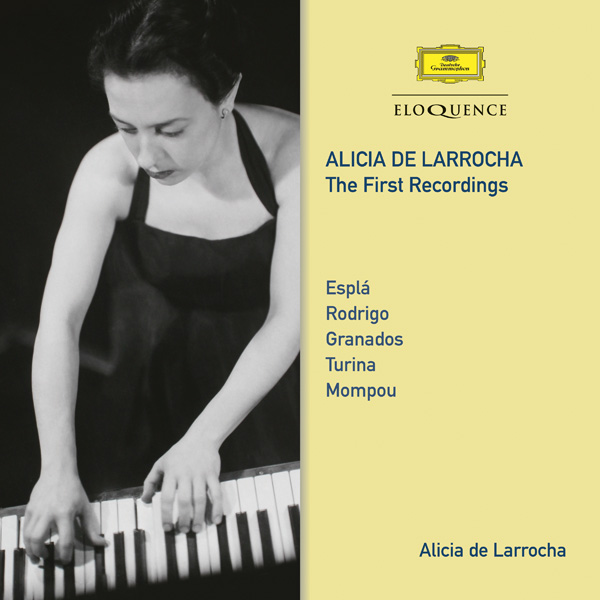A series of reissues on Eloquence has served to remind listeners around the world of the mastery of Alicia de Larrocha in repertoire ranging far beyond her native Spain, from Bach to Rachmaninov (including the Third Concerto with the LSO and André Previn, available on 482 0725). However, as Fanfare magazine noted in 1990, ‘her dominance of Spanish piano music recordings over the last thirty years has put her in the position where her most formidable competition is usually herself’.
That dominance began with recordings – Larrocha’s first – made in New York by American Decca during 1954–55. These are now reissued collectively on CD. They include many of the classics of the Spanish piano repertoire: the ‘Danzas Españolas’ and ‘Goyescas of Granados’, ‘Danzas fantásticas’ of Turina and ‘Danzas de España’ of Rodrigo principal among them.
In later recordings. de Larrocha would go on to refine certain details but the seamless legato, sparkling fingerwork and unmatched evocation of mood were there from the beginning as critics were not slow to recognise: when the ‘Goyescas’ were first issued in October 1955, Gramophone magazine proclaimed that of the five available recordings, ‘honours go to Decca’s Alicia de Larrocha, one with style, technique and colour.’ In August the following year, Lionel Salter observed of the same recordings that ‘her technique is impeccable and sparkling and articulation faultlessly clear-cut: Miss Larrocha has abundant vitality and, in ‘El Pelele’, clearly, fantasy too’.
De Larrocha herself was a reluctant recording artist. ‘The personal sound of the artist becomes lost and without that, there is nothing,’ she remarked: a testament to the perfectionist temperament recalled in a specially written tribute for the booklet of this release by the pianist’s daughter, Alicia Torra. She goes on to note that of the five composers who appear in this set, her mother personally met four of them: Turina, Esplá, Rodrigo and especially Mompou with whom she maintained a close friendship. In fact it was her playing of the fifth, Granados, that dazzled early listeners such as the American critic Harold C. Schonberg: ‘Obviously this music is in the pianist’s blood. She invested it with a degree of life and imagination that not many pianists before the public today could begin to duplicate.’
The booklet also includes rare photographs and a manuscript autographed by Turina himself for the little Alicia.
CD 1
ÓSCAR ESPLÁ: Sonata española, Op. 53
JOAQUÍN RODRIGO: Tres Danzas de España
ENRIQUE GRANADOS: 12 Danzas Españolas
CD 2
JOAQUÍN TURINA:
Danzas fantásticas
Preludios, Op. 80 (Ciclo pianístico VII)
Recuerdos de la antigua España, Op. 48
Partita in C major, Op. 57 (Ciclo pianístico II)
ENRIQUE GRANADOS:
Escenas románticas
CD 3
Goyescas, o Los majos enamorados
El pelele
FREDERIC MOMPOU: Impresiones íntimas
Alicia de Larrocha, piano
Recording Producer: Thomas Frost
Recording Location: Pythian Temple, New York, USA, 5–15 March 1954 (Granados: Danzas Españolas, Escenas románticas; Turina), 21–29 April 1955 (Esplá; Rodrigo; Granados: Goyescas, El pelele; Mompou)
‘Miss Larrocha strikes me as one of the very best pianists to have come out of Spain in recent years. She has an impeccably clean technique, considerable strength, verve and temperament but a level enough head to keep her from exaggerating effects … Her tonal sense and phrasing are exemplary.’ Gramophone (Turina)

